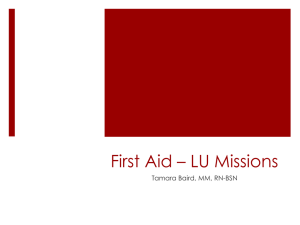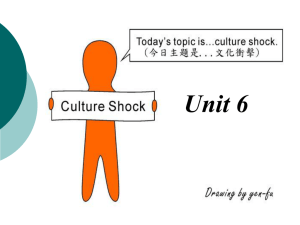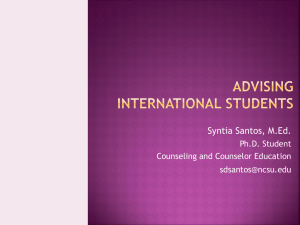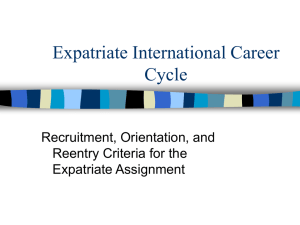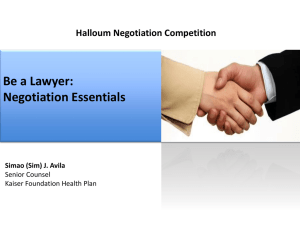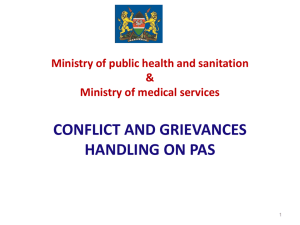Ch 8 Handling_Culture_Shock_Effectively_12x
advertisement
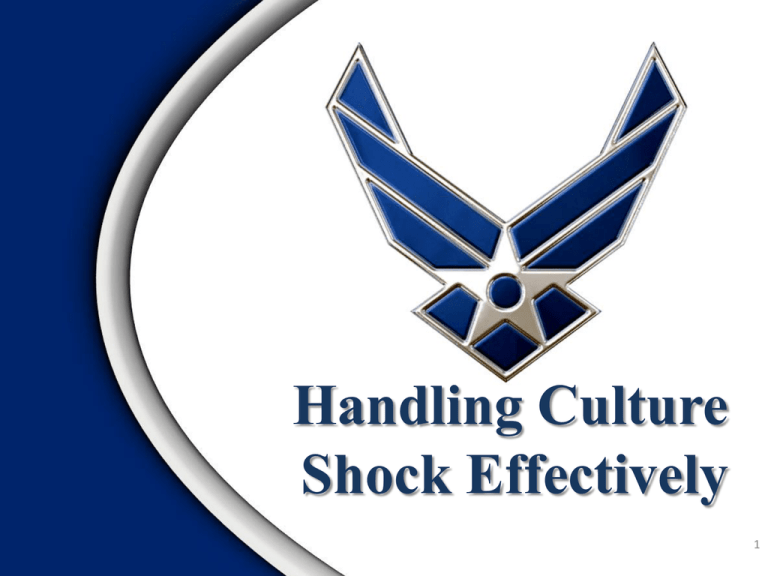
Handling Culture Shock Effectively 1 Culture Shock Video 2 Overview • Defining the Terms: Culture Shock and Country Shock • Stages of Culture Shock • Managing Country and Culture Shock • The Role of Culture in Conflicts and Conflict Resolution • A Leader’s Role in Handling Culture Shock 3 What is Culture Shock? • How would you define culture shock? • Reaction to psychological disorientation • Fish out of water feeling 4 What is Culture Shock? • Causes of Culture Shock • Being cut off from cultural cues and patterns • Living/working over an extended period of time in ambiguous situations • Having your values questioned • Being expected to operate at maximum skill and speed without fully understanding “the rules” 5 What is Culture Shock? • • • • • • Effects/Symptoms of Culture Shock Intense discomfort Resentment Homesickness Depression Variety of physical symptoms from psychosomatic illnesses 6 Country Shock vs. Culture Shock • Country Shock – Physical circumstances – The setting of the culture – Occurs/resolves quickly • Culture Shock – Interaction among people – Behaviors that seem strange to others – Takes longer to begin/resolve 7 Country Shock • What can bring on country shock? – Unfamiliar weather patterns – “Strange” foods – “Bugs” (insects, spiders, etc.) that make life uncomfortable – Infrastructure differences 8 Country Shock • What can heighten the intensity of country shock? – New faces and communities – Getting physically sick 9 Stages of Culture Shock • Honeymoon • Irritability/Hostility • Gradual Adjustment • Adaptation 10 The Honeymoon Stage • Characteristics – Occurs at beginning of deployment – Positive mindset – High expectations – Focus on similarities between home and host culture – Typically lasts 1-6 weeks 11 Irritability/Hostility Stage • Actions during irritability – Withdrawal from host culture – Interacting only with other Americans – Interacting only with other military personnel • Actions during hostility – Verbal aggressiveness – Physical aggressiveness – Stereotyping 12 Gradual Adjustment Stage • What it takes to get there – Time – Recognizing subtle cultural cues – Less isolation/greater comfort – More interaction with host culture 13 Adaptation Stage • How you know you’ve arrived – Greater enjoyment of local customs – Comfort with host culture communication norms – Realization that you will miss aspects of host culture when you return home 14 Dealing With Country Shock • • • • • • Ineffective responses Returning to “mother culture” Hide out (stay on base/compound) Travel to areas of greater cultural diversity Effective response Establish new routines for basic life skills 15 Managing Culture Shock • Effective responses • Realize almost everyone experiences a certain level of culture shock • Develop self-awareness of your behavioral expectations • Understand the local’s expectations for your behavior 16 Managing Culture Shock • We inflict culture shock on others by… – being ethnocentric – not becoming “other” – failing to practice empathy – reinforcing the concept “the ugly American” of 17 Conflict Video 18 Conflict • What is conflict? • Struggle over values and claims to scarce status, power, and resources • Perceived divergence of interests • Our working definition: When two related parties find themselves divided by perceived incompatible interests or goals, or in competition for control of scarce resources 19 Conflict • Causes of conflict? – Value differences – Relationship clashes – Disagreement over data – Diverging interests 20 Culture and Conflict • Role of culture in conflict – It’s about who we are so it’s bound to impact conflict – It relates to what we think is important, and we often respond strongly when that’s challenged – It can be the direct cause of conflict – It can be a contributing factor 21 Culture and Conflict • Culture affects conflict in how we… – Name (describe it) – Frame (conceptualize it) – Blame (assign fault for it) – Tame (resolve it) 22 Culture and Conflict: An Example • Think about the Israeli-Palestinian Conflict – How does culture affect how it is described? – From what framework is it viewed? – Who is blamed? – What is the best way to resolve it? 23 Culture and Conflict Resolution • How would you define conflict resolution? – Eliminating the root cause of a conflict and seeking the solution to the problems which led to the conflict – Methods and processes of negotiation, arbitration, institution-building which promote the peaceful ending of social conflict and war 24 Culture and Conflict Resolution • Methods of conflict resolution – Mediation – Diplomacy – Negotiation (most commonly used) – War 25 Negotiation • What is negotiation? – Striking a deal with someone – Bargaining – Discussing an issue with the hope of settling it – When two or more parties confer with one another to reach a mutually accepted outcome 26 Negotiation • Situations requiring negotiation skills – Personal life – Within squadron – While deployed with local population and leaders – With joint/coalition/allied forces – With other organizations (governmental and nongovernmental) 27 Personality & Negotiation • Impact of personality on negotiation – Some traits more conducive to successful negotiation than others – Some traits counterproductive to negotiation – Some traits are better suited to other conflict resolution techniques, e.g., mediation, diplomacy, competing-forcing, etc.) 28 Negotiation in the Military • Military personality and negotiation – Typical Airman may not be predisposed to negotiation – Hierarchical mindset (chain of command) – Leans more toward compliance than negotiation 29 Negotiation in the Military • When can negotiation skills be helpful to you? – Contingency ops – Peacekeeping ops – Humanitarian relief responses – Personal life 30 Cultural Dimensions & Negotiation • Hofstede’s Cultural Dimensions – Power Distance – Uncertainty Avoidance – Individualism vs. collectivism – Long-term vs. short-term orientation 31 Wrapping Up Our Discussion As an Air Force leader, what is your role in handling culture shock effectively? 32 Summary • Defining the Terms: Culture Shock and Country Shock • Stages of Culture Shock • Managing Country and Culture Shock • The Role of Culture in Conflicts and Conflict Resolution • A Leader’s Role in Handling Culture Shock 33

